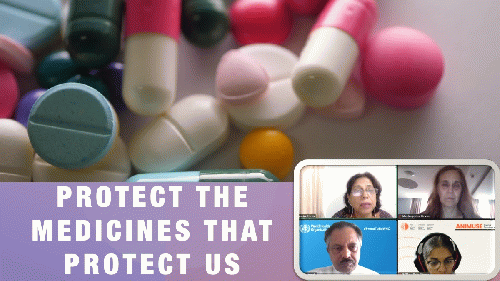Fork in the road: Will we protect medicines that protect us or deal with incurable diseases?
SHOBHA SHUKLA - CNS

World Antimicrobial Awareness Week (WAAW) is observed from 18-24 November every year
(Image by CNS) Details DMCA
As the world observes the annual World Antimicrobial Awareness Week (WAAW) from November 18 to 24, the spotlight is once again on preventing antimicrobial resistance that is not only devastating human health but also threatening the sustainability of our planet earth. Will we protect the medicines that protect us or lose them, resulting in diseases that become difficult or impossible to treat? "The answer my friend is blowing in the wind" as the legendary lyrics go.
What is antimicrobial resistance?
Antimicrobial resistance occurs when bacteria, viruses, fungi or parasites become resistant to, and hence no longer respond to the antimicrobials or drugs (antibiotics, antivirals, fungicides and parasiticides) used to treat the diseases caused by them. While antimicrobials are the backbone of modern medicine, their misuse and overuse in humans, animals and plants is driving the emergence and spread of antimicrobial resistance, making it difficult or even impossible to treat infections, increasing the risk of disease spread, severe illness and death.
Progress on all SDGs threatened by antimicrobial resistance
Antimicrobial resistance is not only causing a huge loss of human life (contributing to over 6 million deaths every year directly and indirectly) but also posing a crippling mountainous economic burden, said Dr Haileyesus Getahun, who is the Director, Global Coordination and Partnership on antimicrobial resistance, and also the Director, Quadripartite Joint Secretariat on antimicrobial resistance at the World Health Organization (WHO). Dr Getahun was the inaugural speaker at a recently concluded 2nd Annual Global Media Forum in lead up to 2022 World Antimicrobial Awareness Week.
According to a 2017 World Bank report, if no action is taken now, antimicrobial resistance is likely to cause an USD 1.2 trillion additional health expenditure per year by 2050, and push up to 24 million additional people (particularly in low-income countries) into extreme poverty by 2030. Dr Getahun warned that antimicrobial resistance can directly affect progress on at least 6 of the 17 UN Sustainable Development Goals and can be linked indirectly to the remaining 11 as well.
(Note: You can view every article as one long page if you sign up as an Advocate Member, or higher).





